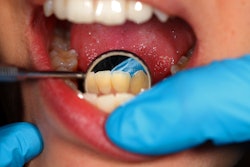Gum disease may be linked to a higher risk of preeclampsia, a serious complication during pregnancy characterized by high blood pressure and signs of organ damage. The study was published recently in the International Journal of Dentistry.
Therefore, improved coordinated care among dental professionals, obstetricians, and midwives is needed, the authors wrote.
“From a clinical perspective, the prevention of preeclampsia through the management of periodontal disease (PD) is a plausible strategy,” wrote the authors, led by Somayeh Ansari Moghaddam of Zahedan University in Iran (Int J Dent, June 3, 2025, Vol. 1, 3360082).
To explore the link between PD and preeclampsia, researchers conducted a systematic review and meta-analysis using studies from 2021. The review included articles reporting on blood pressure, urine protein levels, and risk factors during pregnancy, they wrote.
Preeclampsia was defined as new-onset hypertension after 20 weeks of gestation, along with proteinuria, or other signs of systemic involvement. Periodontitis was identified based on clinical indicators like clinical attachment loss, probing depth, bleeding on probing, and radiographic bone loss.
Women with PD had a significantly higher risk of developing preeclampsia (odds ratio [OR] = 1.20; 95% confidence interval [CI], 1.01 to 1.42), with a 21% increased likelihood compared to healthy individuals. A temporal analysis revealed the risk was 1.3 times higher postpartum and 2.9 times higher after 20 weeks of pregnancy, suggesting the association strengthens as pregnancy progresses, they wrote.
The findings suggest that inflammation linked to PD may play a role in the development of preeclampsia, particularly in later stages when systemic inflammation becomes more pronounced. Although the chi-squared test indicated some heterogeneity, the overall heterogeneity among studies was low.
The study, however, had limitations. Differences in healthcare systems and preventive practices between countries may influence the rates of periodontal disease and preeclampsia, the authors added.
“Given the high prevalence of PD in the general population and the potential for serious pregnancy complications, it is imperative to enhance awareness and education regarding oral health during pregnancy,” they concluded.




















